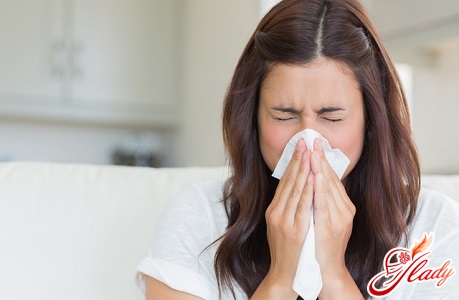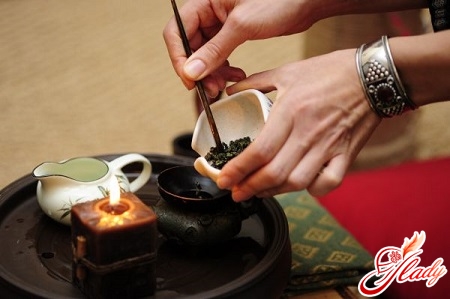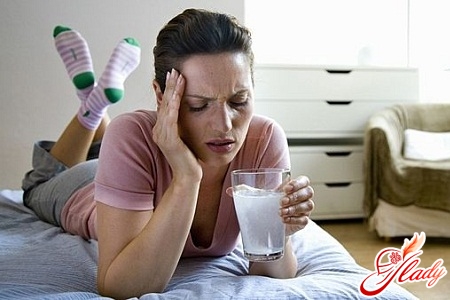
It is generally accepted that a common allergy is notaccompanied by an increase in temperature. Doctors say the opposite. This really happens, but when it comes to atypical allergies. Often the symptoms of an atypical allergy resemble a viral infection, so it's hard to decide which illness you are worried about.
When does the temperature rise?
The temperature for allergy may go up whenDifferent in intensity and individual tolerability, allergens have an effect on the body. These are food pathogens, intolerant drugs, foreign proteins, plasma, vaccines, bites of various insects, flower pollen. This list of allergens is not complete, because there are many types of allergies in people prone to its manifestation. 
Allergies and individual intolerance
It is necessary to distinguish between an allergic condition andindividual intolerance of any exciting factors. So, the allergy arises at once, this is the immediate reaction of the body to the allergen. After the action, the symptoms characteristic of the allergic disease immediately appear: rash, itching, redness of skin areas, sneezing, and fever. If you have an individual intolerance of some product or other irritating factor, then its effect will be visible after some time, even a few days. This is a "belated" reaction of the organism to the pathogen. Various Symptoms of Allergy and Individual Intolerance If we talk about the symptoms of allergy and individual intolerance, then they are similar, but at the same time very diverse. Some symptoms seem to have no similarities to allergies, but, nevertheless, they are found nowadays often. Allergic symptoms are: depressive condition, pain in the joints, pallor, yellow and dry skin, swelling under the eyes, shortness of breath, dizziness and decreased clarity of thinking processes, constipation or diarrhea, cold sores, runny nose, rash, indigestion, dark circles and bags under the eyes , as well as urinary incontinence in children at night.
Allergy and genetic predisposition
Often asked: "Why was the child allergic if both parents had no allergic reactions in childhood and adulthood?" The fact is that the increased excitability and sensitivity to a certain allergen is inherent in nature genetically. If the mother and father of the child are not prone to allergy, but this unpleasant disease has once suffered a grandmother or grandfather, then there is a high probability that the grandson will also be allergic.
Is there a high fever with normal allergies?
Many people ask: Are allergic reactions accompanied by a very high temperature? The allergy has a variety of symptoms, often reminiscent of ARI, but the temperature if it rises, then up to 38. If the allergy is also superimposed on a viral infection (for example, a cold), then the temperature will indeed be high. Then you already need a comprehensive treatment of both diseases, which is prescribed by the doctor. Self-medication is inappropriate and forbidden in this case. 
We are fighting with food allergy
In order to prevent the above-mentionedallergens in the body of a child, they need not be included in the daily diet. Over time, after a month or two, you can carefully try to introduce a small dose of "forbidden" products, but take into account the slightest reaction to allergens. With age in children, many allergens cease to be active, but this depends on the individual's predisposition and the hypersensitivity of the body. Of course, without consulting a pediatrician and a nutritionist (in case of an allergy with adults) can not do, because health - above all. Food allergy in children Food allergy is the most common type, especially in children. The causative agents are most often the following products: honey and bee products (wax, perga), fish, citrus fruits, cocoa, chocolate. The rise in temperature with food allergy is not the main symptom, but accompanied by rash, vomiting, nausea, tenderness of the abdomen and intestines, general anxiety of the child, and in subsequent stages - and swelling of the lymph nodes and areas of the face and neck, should alert the parents. The temperature usually rises to 38, so timely medical attention and normalization of temperature by antipyretic agents is needed. Food allergies and heredity If the parents of the child are prone to manifest allergies to any food, it is often transmitted to their children. Therefore, the mother, knowing about her individual intolerance to a particular foodborne pathogen, should not use it during breastfeeding. To understand whether your child is allergic or not, you can already at the stage of switching the infant's nutrition from breastfeeding to the introduction of complementary foods. If there is a rash on the cheeks, it is clear that the body has an allergen. Strong allergens that cause anaphylactic shock Anaphylactic shock is an extremely acute, serious and life-threatening reaction to an intolerant stimulus. Such a critical condition can cause peanuts. Therefore, if you are careful, the labels usually indicate the possibility of developing allergic reactions in sensitive people. Often allergens are for some marine products, particularly mollusks, but you probably will not find any warning labels on the package. A strong allergen may be a bee or wasp sting, as well as the use of bee products. Symptoms and first aid for anaphylactic shock Symptoms of anaphylactic shock - fever up to 39 degrees, shortness of breath, rapid heartbeat, swelling of the eyelids, face, neck, seizures, a critical drop in blood pressure. If such symptoms are obvious, the first thing to do is to deliver the victim immediately to the nearest medical facility, as often in such cases an injection of epinephrine is required. If possible, you can make an injection yourself. If the patient is difficult to breathe and the edema has already developed enough, the victim needs to put a straw in his mouth to breathe. Nutritional Full Immunity There are times when the body responds to "everything eaten." This condition is caused more often by an intestinal serious disorder - a dysbacteriosis. There is an acute inflammatory process, as a result of which undigested food remains thrown back into the blood. In this case, qualified medical care is needed, since serious complications can develop, up to severe intoxication of the body. Complete food insufficiency also occurs when the liver does not cope with the workload: as a result of alcohol poisoning, increased doses of sucrose or drugs. 
Allergy to medicines
Starting to treat a viral disease, we immediatelywe address to antibiotics, forgetting, that thus we can render not the help, and harm to an organism, causing an allergy on medicines. An allergic condition occurs due to an overdose of the medication, an incorrect drug regimen and as a result of the individual intolerance of the drug or its constituents. Often, medicinal allergy is accompanied by fever. Symptoms of drug allergies Allergy to medications (tablets, injections) is accompanied by the following symptoms: a rash in the form of urticaria, irritations and reddening like tubercles, swelling of Quincke, an increase in body temperature. In more severe cases, anaphylactic shock is observed. If the child complains of abdominal pain, nausea, weakness and dizziness, special attention should be given to these symptoms, as they speak of a serious form of allergy and its danger to the body. Talking about the timing of the allergy to medicines, they distinguish between fast and slow (after a few days) reaction of the body to the stimulus. What measures to take with a drug allergy?
How to prevent allergies to medicines in a child?
- If you know that your child is allergic, do notdo self-medication of a beginning illness, in particular, a cold. In fact from your "care" with the help of antibiotics the children's organism, its immune system suffers.
- Always consult with the leading pediatrician in the choice of medications for a particular disease.
- Use a special dispenser, which is present in children's syrups for colds. Try not to overdose, do not forget about the consequences - the occurrence of allergies.
- You need to know what kind of antihistaminedrugs treat allergies in the child. Therefore, always ask the pediatrician how to help the child in case of an exacerbation at home and by what means.
Temperature for allergy to pollen
The temperature may slightly increase inspring-summer period (in the range of 37-38 degrees, but it is not necessary to shoot down it), when the flowering of trees and flowers takes place. Some people, including children, experience all the "delights" of seasonal allergies to the pollen of flowering plants. Getting into the nose, eyes, bronchi, pollen causes irritation of the mucous eyelids, nose, respiratory tract. Symptoms resemble ARI: there is itch of the eyes, acute rhinitis, sneezing and even the temperature rises. Such a reaction is typical for allergy sufferers and is called allergic seasonal rhinoconjunctivitis. How to treat an allergy to pollen If the spring-summer period has come and you know that an allergic reaction will begin, take care of purchasing antihistamines, which you have been appointed by an allergist. Especially watch allergic children at this time. Before giving any medications, take advice from a pediatric allergist, because the rhinoconjunctivitis can progress and turn into a more serious illness - bronchial asthma or pollinosis. Do not self-medicate!
Is there a temperature when bites insects on allergic soil?
Insect bites are transferred in different ways. The mosquito bite of allergy sufferers causes severe itching, burning and even a rash. When biting bees, gadflies, and wasps, characteristic symptoms are observed: pain in the bite area, redness, swelling at the site of the bite and around it, a moderate shallow rash, fever, and sometimes a severe allergy - anaphylactic shock. How to help the suffering allergy when bitten by insects? Immediately after the bite, carefully inspect the site of the bite. Carefully, not to damage a small bag of poison, pull the sting of the bee with a pair of tweezers, a nail or other object. Treat the bite site with cold water and soap. Apply a bandage with hydrocortisone - soothing pain with ointment. What if after the insect bite, there are symptoms that are close to anaphylactic shock? Or suddenly there was a temperature at an allergy? How to deal with all manifestations? More precisely, these questions can be answered only by a doctor. If everything is much more dangerous, there is a fever, the swelling spreads and the symptoms resemble anaphylactic shock, you need to take suitable antihistamines. Acute allergic reaction is treated by injection of adrenaline. If a child with a severe allergic reaction has suffered, first aid should be given and immediately consult a doctor.









